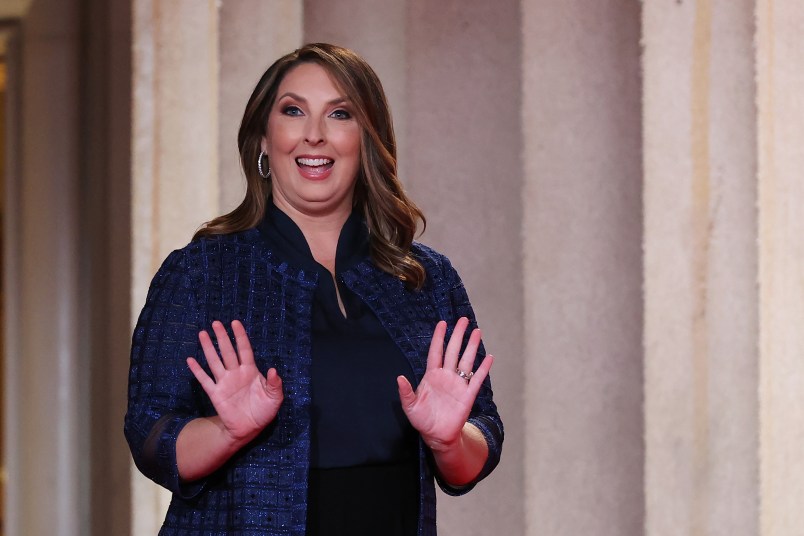We’re seeing an ongoing — and to me, pretty comical — garbage fire at NBC News over the hiring of Ronna McDaniel (or who I guess we might call Ronna X, since her last name may be subject to ongoing contract negotiation) as a paid contributor. I’ll assume you’ve seen at least some reports on the controversy. I want to add three things. First a personal aside, second a guess about what happened and third something about the structural roots of “bothsidesist” news coverage.
First, I can’t say I was particularly whipped up about this in the first place. That’s not because I don’t care. I just don’t look to big corporate news organizations as movement or resistance organizations. It’s just kinda what I expect.
Second, here’s my hunch about the chain of events playing out. This isn’t based on any reporting. It’s my speculation based on having some experience about how news operations operate. You start with the announcement that NBC is hiring Ronna X. It kicks off a big controversy. Rashida Jones, the head of MSNBC, gets out front early and says the decision has nothing to do with her network. Ronna X won’t appear on their shows etc. Whether or not that was the initial idea, that gets MSNBC out of the line of fire. (Reporting today has NBC brass telling Axios that Jones was completely on board with the original hiring decision, along with the heads of all the NBC networks. Who knows?)
When MSNBC pulls up stakes that means that NBC News proper totally owns this. And since Meet the Press is where NBC News does commentary and chat, that really means that Meet the Press owns it. I suspect this leads the Meet the Press talent to say essentially “Fuck this! We’re not owning this turdpile!” And that leads them to really scorch Ronna X on the Sunday show. Maybe it’s one part not owning it, one part an opening Jones and MSNBC gave them. Who knows?
This morning, Morning Joe unloaded on McDaniel, saying the hiring was a mistake, that McDaniel would never appear on their show as a paid contributor. So now Ronna is in the position of a mob capo who no one ever liked and now the boss has withdrawn protection. It gets ugly really fast.
The third point is about corporate news and bothsidesism. This is the part of this story that is more than just fun and schadenfreude. It’s important to understand as a foundational part of today’s news business. The news business is based on ad sales to major corporate advertisers. When I say “major corporate advertisers” I mean that in a purely descriptive sense. I’m not using it in any pejorative sense. These are big and/or highly diversified companies that need access across the political spectrum of the consumer market. To the extent they are not consumer facing entities they have regulatory concerns that mean they need to be able to talk to politicians across the political spectrum. Setting aside the concerns of advertisers, NBC and NBC News are themselves mass consumer brands that want to avoid, if at all possible, losing access to the whole consumer market.
The issue with Ronna X is that these journalists are saying that she’s not just a conservative, not just a Republican and thus able to represent the views of one of the two major political factions in the United States. Because of her consistent espousal of the Big Lie and at least soft defense of January 6th, she’s actually outside the bounds of legitimate democratic political discourse. To the extent she was just lying or doing what she was told when she did those things it’s almost as bad and she lacks any credibility. But that’s not really relevant to the business needs and goals of the parent company. Because one of the two major political factions of the country supports election denial and, at least to an extent, the January 6th insurrection itself. So one of those two factions is itself outside the bounds of legitimate democratic political discourse. But that’s an impossible position for the owners of NBC and the executives who run it. My point isn’t to justify anything. I’m just noting that the two things are basically irreconcilable.
Now let me note what I guess I’ll call “Third: B.”
I was talking to someone a few days ago who told me about an upcoming book in which the author argues that bothsidesism has actually gotten worse in political journalism since the 1990s, despite the fact that recognition of its shortcomings has grown. Is that true? To the extent it is, I think I know why.
You’ll notice that journalism outfits are going under right and left and pretty much constantly. The one big exception is in the DC political news space. Brands like Politico and Axios are being sold for massive exits. And new entrants like Punchbowl and Semafor keep hopping in. That’s because the DC political news advertising space operates by entirely different rules than every other part of the political news business. The pot of advertising money available is essentially a subset of corporate America’s lobbying budget. Advertising and particularly event sponsorship — which is where the big money is for these publications — is a way of corporate America (and to a lesser extent activist organizations) to speak directly to the people who run the state — the members of Congress, executive branch officials, both appointive and career, Capitol Hill staffers, the whole array of think tanks and organizations that amount to a para-government.
Again, the money that sustains those publications comes from corporations and other advertisers who want to be talking to the decision-makers who run the American state. We have two parties in the U.S. They both play a big role in running the state. You need to be talking to both. I don’t mean this in a corrupt sense, at least not narrowly speaking. Candy manufacturers want to talk to people who might buy candy. The travel industry wants to talk to people who go on vacations. Advertisers in the DC market want either help from government decision-makers or at least an open channel of communication. That’s the business. If you get tagged as not speaking to both sides, as being right wing or left wing or even a shade of either your whole business model is torched. Because if it happens to the publication, it rubs off on the advertisers. And that’s lethal for the advertisers’ relationship with lots of those decision-makers.
The point here is that bothsidesism, as we call it, is heavily, heavily rooted in the core business model. And that matters way more than the personalities of the reporters or the theories they come up with about why bothsidesism makes sense. It’s not that reporters or editors are necessarily thinking about what I describe here. It’s more like the water they swim in. It’s part of the culture of DC journalism. But if the question is why is that the culture or why is it so fixed in place, it’s that business model that explains it.
And if the question of how or why might this be worse than it was … say 30 years ago, it’s that those DC publications play a much, much bigger role setting the tone for the national political conversation than they did back then. And that’s because in most cases they didn’t even exist back then.


 Member Newsletter
Member Newsletter
